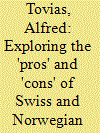|
|
|
Sort Order |
|
|
|
Items / Page
|
|
|
|
|
|
|
| Srl | Item |
| 1 |
ID:
023929


|
|
|
|
|
| Publication |
London, Macmillan, 1986.
|
| Description |
vii, 280p.Pbk
|
| Standard Number |
0333370287
|
|
|
|
|
|
|
|
|
|
|
|
Copies: C:1/I:0,R:0,Q:0
Circulation
| Accession# | Call# | Current Location | Status | Policy | Location |
| 027512 | 940.5/COO 027512 | Main | On Shelf | General | |
|
|
|
|
| 2 |
ID:
071603


|
|
|
|
|
| Publication |
2006.
|
| Summary/Abstract |
A theoretical appraisal of the Swiss and Norwegian models of relations with the European Union (EU), as well as an empirical assessment of experience accumulated, shows that the European Economic Area (EEA) model is quite constraining. Both models have semi-colonial features. In the EEA model, the non-EU member has a little more influence on decision-making but is less independent of the EU than with the Swiss approach. The latter is time-consuming and is subject to much give and take. In the long run, however, countries expected to benefit from the new European Neighbourhood Policy, such as Israel, might find that an EEA approach is not acceptable if it does not offer membership as a long-term possibility, because it is undemocratic. Finally, in the eventuality of a trade war between the United States and the EU, a scenario of high relevance for Israel, the Swiss model would give it more freedom of manoeuvre than the EEA model. Israel would not be part of the EU trading bloc in the eyes of the United States.This is much less clear in the event of EEA membership. On the other hand, an in-depth examination of the Swiss model shows that the 'à la carte' approach does not allow for any degree of depoliticization in relations with the EU, as Israel was hoping for.
|
|
|
|
|
|
|
|
|
|
|
|
|
|
|
|
| 3 |
ID:
137785


|
|
|
|
|
| Summary/Abstract |
The Korean government's engagement in FTAs since the late 1990s has been enthusiastic. As of 2012, the Korean government concluded FTAs with small trading partners such as Chile, Singapore, EFTA, ASEAN, India, Peru, and Turkey, and major counterparts such as the European Union (EU) and the United States as well. However, the degree of each of the Korean administrations' engagement in FTAs has shown discernible differences: While the Kim Dae-jung administration passively engaged in FTAs, the Roh Moo-hyun administration was proactive in that engagement. What explains the shift from the Kim administration's passive FTA policy to the Roh administration's comprehensive multi-track FTA policy? This article argues that the appreciation of the Korean won since 2001 made Korean exporters lose their price competitiveness in the global market, thereby forcing the Roh administration to offset Korean exporters' lost price competitiveness by formulating a comprehensive multi-track FTA policy, with huge side payments for politically sensitive import-competing sectors.
|
|
|
|
|
|
|
|
|
|
|
|
|
|
|
|
|
|
|
|
|